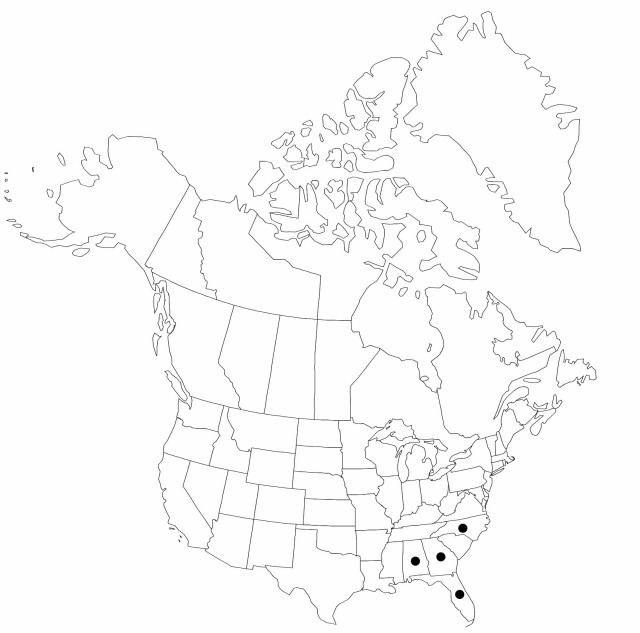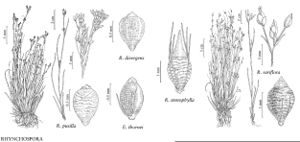Rhynchospora thornei
Sida 7: 42, fig. 1. 1977.
Plants perennial, densely cespitose, 10–20 cm; rhizomes slender, short. Culms lax, filiform, leafy. Leaves spreading to ascending, exceeding or exceeded by culm; blades 0.2–0.3 mm wide, margins strongly involute or channeled, apex trigonous, tapering, setaceous. Inflorescences: cluster of cymes 1–2, widely spaced, turbinate, sparse; branches few; foliaceous bracts setaceous, longer than cymes. Spikelets brown, lanceovoid to fusiform, 2.5–3 mm, apex acuminate; fertile scales ovate, 1.5 mm, apex acute, midrib shortexcurrent. Flowers: perianth absent. Fruits 0.9–1 mm; body lustrous pale-brown, ellipsoidlenticular, 0.8–0.9 × 0.5–0.6 mm, margins narrow, wirelike; surfaces minutely reticulate; bristles 4–6, the longest from shorter than fruit midbody to fully as long, rarely reaching tubercle tip, minutely antrorsely barbellate; tubercle shortconic, to 0.15 mm.
Phenology: Fruiting late spring summer.
Habitat: Fluctuating shores of limesink ponds, seeps over calcareous rock
Elevation: 0–200 m
Distribution

Ala., Fla., Ga., N.C.
Discussion
Of conservation concern.
Rhynchospora thornei, discovered by Robert Thorne from margins of a limesink pond in southwestern Georgia, has been extirpated at that site. Now the taxon is known from several Alabama and Florida locations and was recently found in eastern North Carolina by R. J. LeBlond.
Had S. Gale been sent material of Rhynchospora thornei at the time she was doing her excellent revision, she probably would have treated it as part of her series Rariflorae. Yet without its perianth bristles, R. thornei would be nearly identical to R. divergens and very similar to R. pusilla, both of which belong in subg. Psilocarya. Therefore, it forms an interesting link between subg. Rhynchospora (Eurhynchospora sensu Gale) and subg. Psilocarya.
Selected References
None.
Lower Taxa
"shortened" is not a number."longest" is not a number."wider" is not a number.
